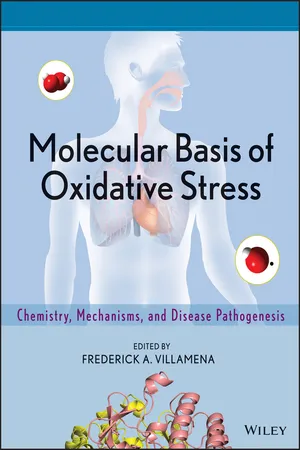
Molecular Basis of Oxidative Stress
Chemistry, Mechanisms, and Disease Pathogenesis
- English
- ePUB (mobile friendly)
- Available on iOS & Android
Molecular Basis of Oxidative Stress
Chemistry, Mechanisms, and Disease Pathogenesis
About This Book
Sets the stage for the development of better diagnostic techniques and therapeutics
Featuring contributions from an international team of leading clinicians and biomedical researchers, Molecular Basis of Oxidative Stress reviews the molecular and chemical bases of oxidative stress, describing how oxidative stress can lead to the development of cancer and cardiovascular and neurodegenerative diseases. Moreover, it explains the potential role of free radicals in both the diagnosis and the development of therapeutics to treat disease.
Molecular Basis of Oxidative Stress is logically organized, beginning with a comprehensive discussion of the fundamental chemistry of reactive species. Next, the book:
- Presents new mechanistic insights into how oxidative damage of biomolecules occurs
- Examines how these oxidative events effect cellular metabolism
- Investigates the role of oxidative stress in the pathogenesis of cancer, neurodegenerative disease, cardiovascular disease, and cystic fibrosis
- Explores opportunities to improve the diagnosis of disease and the design of new therapeutic agents
Readers will find much novel information, including new radical chemistries and the latest discoveries of how free radicals react with biomolecules. The contributors also present recent findings that help us better understand the initiation of oxidative stress and the mechanisms leading to the pathogenesis of various diseases.
Throughout the book, the use of molecular structures helps readers better understand redox chemistry. In addition, plenty of detailed figures illustrate the mechanisms of oxidative stress and disease pathogenesis.
Examining everything from the basic chemistry of oxidative stress to the pathogenesis of disease, Molecular Basis of Oxidative Stress will help readers continue to explore the nature of oxidative stress and then use that knowledge to develop new approaches to prevent, detect, and treat a broad range of disease conditions.
Frequently asked questions
Information
Table of contents
- Cover
- Title page
- Copyright page
- Preface
- About the Contributors
- Contributors
- 1: Chemistry of Reactive Species
- 2: Lipid Peroxidation and Nitration
- 3: Protein Posttranslational Modification
- 4: DNA Oxidation
- 5: Downregulation of Antioxidants and Phase 2 Proteins
- 6: Mitochondrial Dysfunction
- 7: NADPH Oxidases: Structure and Function
- 8: Cell Signaling and Transcription
- 9: Oxidative Stress and Redox Signaling in Carcinogenesis
- 10: Neurodegeneration from Drugs and Aging-Derived Free Radicals
- 11: Cardiac Ischemia and Reperfusion
- 12: Atherosclerosis: Oxidation Hypothesis
- 13: Cystic Fibrosis
- 14: Biomarkers of Oxidative Stress in Neurodegenerative Diseases
- 15: Synthetic Antioxidants
- Index